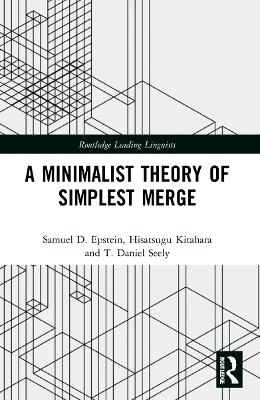
A Minimalist Theory of Simplest Merge
Routledge (Verlag)
978-1-032-07809-0 (ISBN)
This collection explicates one of the core ideas underpinning Minimalist theory – explanation via simplification – and its role in shaping some of the latest developments within this framework, specifically the simplest Merge hypothesis and the reduction of syntactic phenomena to third factor considerations.
Bringing together recent papers on the topic by Epstein, Kitahara, and Seely, with one by Epstein, Seely and Obata, and one by Kitahara, the book begins with an introduction which situates the papers in a cohesive overview of some of the latest research on Minimalism, as facilitated by current theoretical developments. The volume integrates a historical overview of evolutions in Merge, starting with Chomsky’s (pre-Merge) Aspects model up to current theoretical models, including a primer of Chomsky’s most recent theory of Merge based on the concept of Workspace. The Minimalist notions of "perfection" and "simplification" are also outlined, providing clearly explicated coverage of key technical concepts within the framework as applied to grammatical phenomena.
Taken as a whole, the collection both introduces and advances Minimalist theory for students and scholars in linguistics and related sub-disciplines of psychology, philosophy, and cognitive science, as well as offering new directions for future research for researchers in these fields.
Samuel D. Epstein is Marilyn J. Shatz Collegiate Professor of Linguistics, Arthur F. Thurnau Professor and Founding Director of the Weinberg Institute for Cognitive Science at the University of Michigan. He has a special interest in developing an explanatory theory of human (bio-)linguistic cognition and methodological issues more broadly in generative, mentalist explanation, and cognitive science. He is the author of numerous books and articles. Hisatsugu Kitahara is Professor at the Institute of Cultural and Linguistic Studies, Keio University, Japan. His expertise is in theoretical linguistics, addressing fundamental issues regarding the nature of phrase structure. He has published Elementary Operations and Optimal Derivations (1997) and two co-authored books: A Derivational Approach to Syntactic Relations (1998) and Explorations in Maximizing Syntactic Minimization (2015). T. Daniel Seely is Professor of Linguistics at Eastern Michigan University. His research is focused on bio-linguistic theory, specifically on language as an "organ" of the human brain. His work in syntax has appeared in Linguistic Inquiry and Syntax; he’s co-author of a number of books with Samuel D. Epstein, and a co-author of a previous Routledge Leading Linguists volume with Epstein and Hisatsugu Kitahara. He is the recipient of multiple teachings awards and honors.
Acknowledgments
Preface, in Memoriam by Noam Chomsky
Introduction
1. From Aspects' "daughterless mothers2 (aka delta nodes) to POP’s "motherless" sets (aka non-projection): a selective history of the evolution of Simplest Merge
2. Phase cancellation by external pair-merge of heads
3.A labeling analysis of selection in structured coordination
4. Is the faculty of language a "perfect solution" to the interface systems?
5. Merge, labeling, and their interactions
6. Is linguistic variation entirely linguistic?
7. A simpler solution to two problems revealed about the composite-operation Agree
8. Some concepts and consequences of 3rd factor-compliant simplest MERGE
9. Unifying labeling under minimal search in "single-" and "multiple-specifier" configurations
| Erscheinungsdatum | 06.09.2021 |
|---|---|
| Reihe/Serie | Routledge Leading Linguists |
| Zusatzinfo | 17 Line drawings, black and white; 1 Halftones, black and white; 18 Illustrations, black and white |
| Verlagsort | London |
| Sprache | englisch |
| Maße | 152 x 229 mm |
| Gewicht | 235 g |
| Themenwelt | Schulbuch / Wörterbuch ► Wörterbuch / Fremdsprachen |
| Geisteswissenschaften ► Philosophie | |
| Geisteswissenschaften ► Psychologie ► Allgemeine Psychologie | |
| Geisteswissenschaften ► Psychologie ► Verhaltenstherapie | |
| Geisteswissenschaften ► Sprach- / Literaturwissenschaft ► Sprachwissenschaft | |
| ISBN-10 | 1-032-07809-X / 103207809X |
| ISBN-13 | 978-1-032-07809-0 / 9781032078090 |
| Zustand | Neuware |
| Haben Sie eine Frage zum Produkt? |
aus dem Bereich


